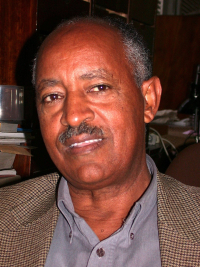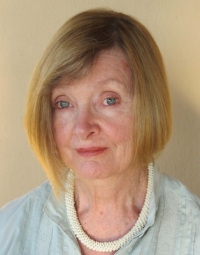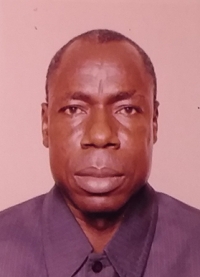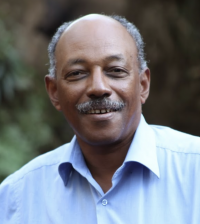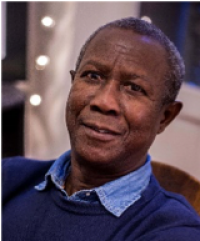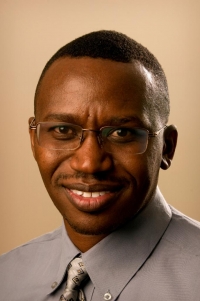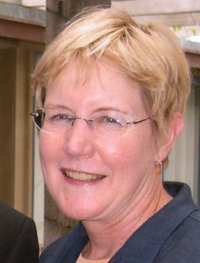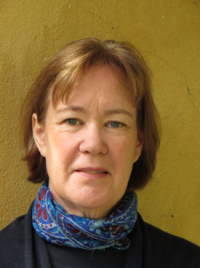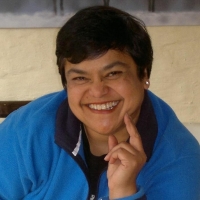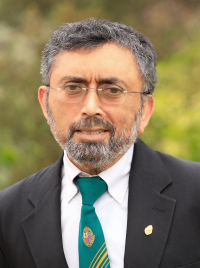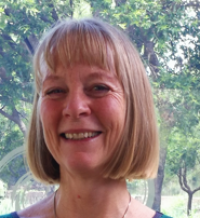Anthropogeny: The Perspective from Africa
Biographical Sketches: Co-Chairs
National Museum of Ethiopia
Berhane Asfaw has spent over thirty years working on the earliest hominids in Africa's Great Rift Valley. His teams are widely credited with discovering fossils providing strong evidence for Africa as the cradle of humanity. The fossils unearthed range from about 6 million years ago to the most complete, earliest modern humans at 160,000 years ago.Dr. Asfaw served as the Director of the National Museum of Ethiopia, and member of the Center for Research and Conservation of Cultural Heritage in Ethiopia. After completing his undergraduate education in Addis Ababa in Geology, he received a fellowship from the Leakey Foundation to pursue a Ph.D. at the University of California, Berkeley. He currently lives in Ethiopia and he is a father of three sons and a daughter. He is currently the manager of the Rift Valley Research Service and a co-director of the Middle Awash Research Project.
University of the Witwatersrand
Lyn Wadley is a Professor based in the Evolutionary Studies Institute at the University of the Witwatersrand (South Africa) where she specializes in Middle Stone Age cognitive archaeology. She is an A1-rated National Research Foundation researcher and recipient of some of South Africa’s top research awards. In 2014 and 2015, she was on the Thomson-Reuters High Citation list that records the top 1% of researchers globally. Her research into cognitive archaeology provides theory and methods for demonstrating that some Stone Age technologies can be proxies for complex brain power. She has excavated three important Middle Stone Age archaeological sites: Rose Cottage Cave in the eastern Free State and Sibudu and Border Caves in KwaZulu-Natal.
Biographical Sketches: Speakers
University of N’Djamena
Likius Andossa is one of the two first paleontologists from Chad. He is currently the chancellor of the University of Moundou. Active member of the french-chadian international research program leading to the discovery of the earliest hominins in Chad, Central Africa, his research expertise extends to several groups of African large ungulates that are key elements of the ecosystems in which the first representatives of humankind lived. He is also interested in the issue of Quality Assurance. He occupied respectively the positions of vice-chancellor at the University of N' Djaména (2012-2017), Sarh University (2012) and Director of Paleontology Department (2009-2012).
Association for Research and Conservation of Culture; French Center for Ethiopian Studies
Yonas Beyene Gebremichael earned his Ph.D. from the National Natural History Museum (MNHN), Paris, in 1991 in Quaternary: Geology, Human paleontology and Prehistory, specializing in Prehistory. He is the Director of the Konso Paleoanthropological Research project and project archaeologist for the Middle Awash and Chorora Paleoanthropological projects. He discovered and published the world’s earliest Acheulean technology and its evolution between 1.75 and 0.8 million years before present. He has published extensively.
He was a member of UNESCO’s World Heritage Committee, representing Ethiopia. For more than 15 years, he directed the Archaeology & Anthropology, Archaeology & Paleontology, and Conservation sections, consecutively, in the Authority for Research and Conservation of Cultural Heritage (ARCCH), Ethiopia. He is member of the Ethiopian Academy of Sciences, Corresponding Member of the Institut de Paleontologie Humaine, Paris, and recipient of the “Palmes Academiques” from French Ministry of Higher Education and Research. He is affiliated with the French Research Center for Ethiopian Studies (CFEE) and the Association for the Conservation of Culture (ACC), Hawassa.
Institut fondamental d'Afrique noire (IFAN), Université de Dakar (Sénégal)
Abdoulaye Camara is a researcher at the Fundamental Institute of Black Africa at the Cheikh Anta Diop University of Dakar (Senegal) where he conducted research in prehistoric archeology and managed museums. He received in June 2018, in Paris, with his team (Senegal, France, Switzerland), the award of the XVIII Word International Union of the Prehistoric and Protohistoric Sciences Congress for the "large archaeological excavations site of long duration in the Falémé valley”. His prospections and archaeological excavations at Sénoudébou, Sansandé, Djita, Guedekou, allowed to find the oldest Paleolithic sites (12,000 to 300,000 years) and to specify the geo-chrono-stratigraphic context of the Quaternary in the region. Today, retired, he continues to follow international research in the Falémé Valley, to carry out ethnoarchaeological research with a Spanish team in the Saloum Delta and to teach cultural heritage at the University of Dakar and at the Senghor University of Alexandria in Egypt.
National Museums of Kenya, Nairobi
Dr. Job Kibii is a senior research scientist and Head of Palaeontology and Palaeoanthropology at the National Museums of Kenya. He was first indigenous African to obtain a PhD in Archaeology and Palaeoanthropology from the University of the Witwatersrand-South Africa. He has directed research in sites such as Malapa, Gondolin, Pangani and Kimengich. Kibii was a member of the discovery team behind Australopithecus sediba and has discovered hominid specimens belonging to Australopithecus africanus and Australopithecus sediba. His research interest includes using taphonomy to understand depositional events in cave systems and the behaviour of early hominins by examining their postcranial morphology.
UC San Diego
Margaret Schoeninger is Distinguished Professor Emerita of Anthropology at UC San Diego, a Research Archaeologist in the Glenn Black Laboratory of Archaeology at Indiana University, and Emerita Co-Director of CARTA. She has done fieldwork in North America, Mexico, Pakistan, India, Kenya, and Tanzania as well as laboratory research on carbon, nitrogen, and oxygen stable isotope ratio analysis in biological tissues and food component analysis of traditional foods. Her major interest is in the evolution of human diet particularly as it informs our understanding of the appearance and evolution of the human lineage.
University of Cape Town
Judith Sealy is a Research Professor in the Department of Archaeology at the University of Cape Town (South Africa), where she specializes in stable isotope analyses of archaeological remains to reconstruct ancient diets and environments. Analyses of human remains provide information on spatial and chronological variation in peoples’ diets, contributing to our understanding of economy and social organization. Studies of animal remains enable us to track environmental and climatic changes, and possible links with developments in human societies. This work combines archaeology with aspects of forensic and environmental science to address questions in human evolutionary ecology.
National Health Laboratory Service (Johannesburg); University of the Witwatersrand
Himla Soodyall is a South African geneticist renowned for her groundbreaking genetic research into the peoples of sub-Saharan Africa in which her studies have identified some of the oldest DNA found in living people today, adding weight to the theory that modern humans evolved in the area now known as southern Africa. She obtained an MSc in biotechnology and a PhD in human population and evolutionary genetics from the University of the Witwatersrand (Johannesburg). Soodyall spent 4 years at Pennsylvania State University doing postdoctoral research with Mark Stoneking, one of the first researchers to advance the 'Out of Africa’ hypothesis on human origins. In 1966, she returned to South Africa to set up her own laboratory at the South African Institute for Medical Research, conducting population and evolutionary genetics research within the Department of Human Genetics. In 2001, Soodyall was appointed director of the Human Genomic Diversity and Disease Research Unit (HGDDRU), which the Medical Research Council had established in partnership with the university and the National Health Laboratory Service, as the SAIMR was now called. She was, until recently, a principal medical scientist at the NHLS as well as an associate professor at the University of Witwatersrand (Wits). As of November 1, 2018, Soodyall has been appointed as Executive Officer of The Academy of Science of South Africa (ASSAf).
UC San Diego School of Medicine
Ajit Varki is a Distinguished Professor of Medicine and Cellular & Molecular Medicine, Emeritus Co-Director of CARTA, Emeritus Co-Director of the Glycobiology Research and Training Center at UC San Diego, and Adjunct Professor at the Salk Institute. He received basic training in physiology, medicine, biology, and biochemistry at the Christian Medical College (CMC), Vellore, The University of Nebraska, and Washington University in St. Louis. He also has formal training and board certification in internal medicine, hematology, and oncology. Varki is the executive editor of Essentials of Glycobiology (Cold Spring Harbor Press, 4th Edition, 2022) and is recipient of a MERIT award from the NIH, and an American Cancer Society Faculty Research Award. Honorific elections include the American Academy of Arts and Sciences, the National Academy of Medicine, the American Society for Clinical Investigation, and the Association of American Physicians. He is also recipient of the three highest honors in his field, the Karl Meyer Award of the Society for Glycobiology, the International Glycoconjugate Organization Award and the Rosalind Kornfeld Award for Lifetime Achievement in Glycobiology. He is recognized for creating the first major open access research journal (J. Clin. Invest., 1996) as well as the first major open access textbook (Essentials of Glycobiology, 2009). He was honored with the Old Cottonian of Eminence Award at the 150th Anniversary of Bishop Cotton Boys School, Bangalore, India, (2015) as well as a Distinguished Faculty Medal and Oration at his medical school alma mater, CMC, Vellore. Significant past appointments include: Co-Head, UC San Diego Division of Hematology-Oncology; President of the Society for Glycobiology; Editor-in-Chief of the Journal of Clinical Investigation; Interim Director of the UC San Diego Cancer Center, President of the American Society for Clinical Investigation, and UC San Diego Associate Dean for Physician-Scientist Training. Varki's research interests are focused on a family of cell surface sugars called sialic acids, and their roles in biology, evolution and disease. Currently, active projects are relevant to the roles of sialic acids in microbial infectivity, the regulation of the immune response, the progression and spread of tumors, aging, and unique aspects of human evolution. His group is particularly intrigued to find multiple interrelated differences in sialic acid biology between humans and our closest evolutionary cousins, the "great apes." These differences are a signature of the events that occurred during the last few million years of human evolution, and appear to be relevant to understanding several aspects of the current human condition, both in health and disease. Varki’s book, Denial (Twelve, Hachette Books, 2013), explores a novel "Mind Over Reality Transition” (MORT) theory that denying reality and personal mortality was a key step in allowing the emergence of a full theory of mind, and in the origin of our species.
University of the Witwatersrand
Sarah Wurz is an Associate Professor at the School of Geography, Archaeology and Environmental Studies and associated with the SFF Centre for Early Sapiens Behaviour (SapienCE), University of Bergen. Her research interests and publication record include Middle Stone Age landscape archaeology and behavior, archaeological heritage resource management and tourism and the origins of music. Her multidisciplinary background and expertise provide a unique approach to investigate ancient behavior and cognition. She excavates the Klasies River main site, a key site for understanding the origins of Homo sapiensin Africa. The papers that she published on Klasies River contributed new information on the Middle Stone Age lithic technology, and more recently, on site formation and palaeo-environments during the last Interglacial.
